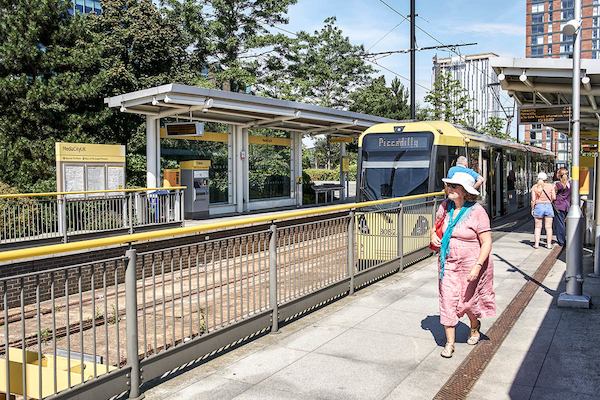What the English Devolution Bill means for the age-friendly movement in England

A substantial reform of local authority structures is set to get underway across England.
Our Strategic Partnership Manager, Bianca Rossetti, explains how the changes create opportunities to develop practice and policy that helps us all to age better.
The English Devolution and Community Empowerment Bill being discussed in Parliament next week details proposals to transfer powers away from Westminster, while also simplifying and standardising local government. These powers will first affect the English regions with devolution deals and metro mayors already in place. Renamed ‘Strategic Authorities’, the intention is that these will eventually cover the country.
Strategic authorities across the country will have powers around:
- Transport and local infrastructure
- Skills and employment support
- Housing and strategic planning
- Economic development and regeneration
- Environment and net zero
- Health, wellbeing and public service reform
- Public safety
As a result of the expansion of devolution we are likely to soon see more places adopting flagship projects along the lines of those already seen in established combined authorities – such as bus franchising, help for homeowners to retrofit their homes, and investments in cycling and walking infrastructure – as well as significant changes to the way public services are run.
Here are where we see some of the key opportunities to influence practice and policies to benefit older adults and promote better ageing for all:
Improving health through a focus on prevention
In line with the new NHS 10-year plan, the Bill focuses on moving from crisis response to prevention including a shift from GP-led primary care to community care, and creating more health-promoting environments. We are seeing combined authorities announcing strategies focused on prevention already, such as the Live Well approach from Greater Manchester, South Yorkshire’s Health Equity Panel, and a pledge from 12 Mayors to create a walking, wheeling and cycling network focused on areas with the poorest health and air quality.
Where this attempt to increase population health can fail is if early intervention is solely applied to younger people. The evidence shows there can also be huge success from approaches to improving health for people in their fifties, sixties and beyond, such as adaptive exercise groups, nutrition and hydration programmes, and increasing access to health screenings and mental health support.
Tackling unsafe and poor-quality homes
Provisions around housing and planning offer opportunities to address some of the major housing challenges facing older people, including the poor quality of much of the country’s mainstream housing and the lack of accessible housing. Potential solutions include funding for warm homes, and a combination of levers and incentives to deliver on new and affordable homes. Mayors will be able to intervene to speed up stalling developments and make compulsory purchases while also being required to produce spatial development strategies.
Creating more age-friendly homes that are accessible and easily adaptable and well-located for services and spaces that promote good health and wellbeing, benefits not just those looking to move home, but will ensure more people can remain living in their homes for longer in the future.
While we are calling for the government to set M4(2) as the minimum standard for new-build homes, Strategic Authorities can also play a role in this by setting the bar higher than is legally required, to improve their region’s health and future-proof their housing stock. Greater London already has higher minimum standards, and as a result has the highest proportion of accessible homes in the country.
Removing barriers to work
Crucial to improving health, wellbeing and financial security is enabling people in mid and later life to find good work and remain in work as long as they choose. Employment rates for people aged 55-64 significantly lag behind the government’s target employment rate of 80% and older workers are more likely to end up long-term unemployed than younger people. The devolution of employment and skills support offers an opportunity for local places to create tailored, effective programmes to improve the standard of employment opportunities for older workers in their region.
Some established strategic authorities are already a few years into flagship projects to improve standards in employment, such as good employment or fair work charters (Greater Manchester, West of England, West Yorkshire, Liverpool City Region, and North of Tyne). There is also learning coming from programmes which support people to find or stay in work alongside a holistic package of support to tackle the causes of work-related challenges through offers such as housing advice, access to NHS services, and workplace adjustments.
Empowering communities
It is notable that the Bill has added the suffix ‘and Community Empowerment’ to the preceding white paper’s title, emphasising the elements that aim to increase residents’ influence on their local areas and give people more ownership of the places and services in their neighbourhood.
The white paper cited several measures that show a marked decrease in local area satisfaction and a growing sense of decline among people of all ages over the past few years – something we know will be keenly felt by older people who are more likely to have lived in their neighbourhood for a long time. The White Paper’s foreword states that “Policies have been done to communities, rather than for and with them, with one-sized-fits all approaches and complicated funding processes that reflect the silos of Whitehall rather than the needs of communities”.
The Bill attempts to address this through a duty for all English local authorities to put in place arrangements for neighbourhood-level governance, as well as introducing several measures to encourage community ownership of local assets.
With the planned removal of district councils we could also see a greater increase in the transfer of community assets, such as toilets, community hubs, and playing fields to communities or to town and parish councils as seen in Cornwall. This offers a real opportunity for smaller councils to ensure these amenities are more available and accessible to older people.
We welcome the move towards giving communities a greater say in their local area – as highlighted in our Age-friendly Communities Handbook - but strategies to improve places only work when residents of all ages are central to shaping plans and delivery. It is only truly meaningful and inclusive when this is done a way that does not disadvantage those who are digitally excluded, with access needs, or who have lower levels of trust in local government for a variety of reasons.
Some strategic authorities have already adopted pioneering approaches to involving communities in decision-making, including the Ageing in Place Pathfinder in Greater Manchester, which has worked in ten neighbourhoods to create resident-led action plans with several changes, such as improvements to walking routes and new community gardens, already delivered.
Transport and infrastructure
There have been a number of bold actions taken by strategic authorities that show what is possible within a devolution framework, including a recent announcement on trialling 24-hour use of the older persons bus pass in Greater Manchester, allocating funding to bus and tram stop improvements, and supporting accessibility improvements for local spaces through York and North Yorkshire’s Community Buildings Programme.
The opportunity for bus franchising, expected to be picked up by a number of strategic authorities, can be transformative when done right – with better geographical coverage, real-time information at stops and better accessibility all potential benefits.
What do you think?
English devolution undoubtedly has the potential to tackle the key causes of avoidable inequalities in ageing – poor housing, unsuitable work and employment support, and people feeling invisible in their communities through inaccessible spaces and services and a lack of voice.
How is your local authority responding to this legislation? We welcome conversations with anyone working in a strategic authority, or any local authorities affected by these changes.
We’d love to know about anything happening in your area which responds to these opportunities or discuss ideas for adopting good practice and evidence around ageing. Get in touch at [email protected]














